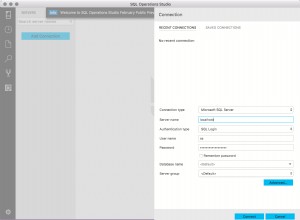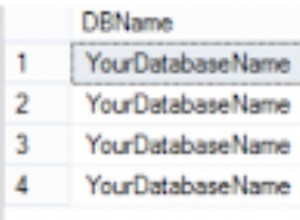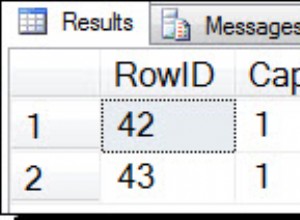Alternatywne rozwiązanie dla DCount i DLookup z zapleczem MS SQL Server
Jednym z głównych problemów, jakie napotkaliśmy w programie Access, jest użycie funkcji DLookup i DCount podczas korzystania z tabel programu SQL Server. Ostatnio pracowaliśmy nad migracją czystego rozwiązania Access do serwera SQL i napotkaliśmy opóźnienia w ładowaniu kilku formularzy. Było to spowodowane użyciem DLookup i DCount w kodzie VBA.
Następnie wymyśliliśmy rozwiązanie, aby szybko rozwiązać wiele instancji za pomocą kilku funkcji. Kierowaliśmy się innym rozwiązaniem dostarczonym przez Allena Browne, który zaprojektował Extended DLookup tutaj w tym łączu.
Rozwiązanie Allena poprawia wydajność DLOokup poprzez:
- W tym porządek sortowania, aby zapewnić uzyskanie pożądanego wyniku.
- Sprzątanie po sobie.
- Prawidłowo rozróżnia ciąg pusty i ciąg o zerowej długości.
- Ogólna poprawa wydajności.
Poszliśmy o krok dalej, aby pracować konkretnie z tabelami lub widokami SQL, nie będą one działać z lokalnymi tabelami Access, ponieważ używamy konkretnie połączenia ADO.
Dołączam kod dla obu funkcji, aby zastąpić zarówno DLookup, jak i DCount
Public Function ESQLLookup(strField As String, strTable As String, Optional Criteria As Variant, _
Optional OrderClause As Variant) As Variant
Dim rs As ADODB.Recordset 'To retrieve the value to find.
Dim rsMVF As ADODB.Recordset 'Child recordset to use for multi-value fields.
Dim varResult As Variant 'Return value for function.
Dim strSQL As String 'SQL statement.
Dim strOut As String 'Output string to build up (multi-value field.)
Dim lngLen As Long 'Length of string.
Const strcSep = "," 'Separator between items in multi-value list.
'Initialize to null.
varResult = Null
'Encapsulate Domain in brackets if none exist to allow special characters in the Domain string
If Left$(strTable, 1) <> "[" Then
strTable = "[" & strTable & "]"
End If
'Build the SQL string.
strSQL = "SELECT TOP 1 " & strField & " FROM " & strTable
If Not IsMissing(Criteria) Then
strSQL = strSQL & " WHERE " & Criteria
End If
If Not IsMissing(OrderClause) Then
strSQL = strSQL & " ORDER BY " & OrderClause
End If
strSQL = strSQL & ";"
'Lookup the value.
OpenMyRecordset rs, strSQL, rrOpenForwardOnly, rrLockReadOnly, True
If rs.RecordCount > 0 Then
'Will be an object if multi-value field.
If VarType(rs(0)) = vbObject Then
Set rsMVF = rs(0).Value
Do While Not rsMVF.EOF
If rs(0).Type = 101 Then 'dbAttachment
strOut = strOut & rsMVF!FileName & strcSep
Else
strOut = strOut & rsMVF![Value].Value & strcSep
End If
rsMVF.MoveNext
Loop
'Remove trailing separator.
lngLen = Len(strOut) - Len(strcSep)
If lngLen > 0& Then
varResult = Left(strOut, lngLen)
End If
Set rsMVF = Nothing
Else
'Not a multi-value field: just return the value.
varResult = rs(0)
End If
End If
rs.Close
'Assign the return value.
ESQLLookup = varResult
ErrEx.Catch 11 ' Division by Zero
Debug.Print strSQL
MsgBox "To troubleshoot this error, please evaluate the data that is being processed by:" _
& vbCrLf & vbCrLf & strSQL, vbCritical, "Division by Zero Error"
ErrEx.CatchAll
MsgBox "Error " & err.Number & ": " & err.Description, vbCritical, "Unexpected error"
ErrEx.Finally
Set rs = Nothing
End Function
Public Function ESQLCount(strField As String, strTable As String, Optional Criteria As Variant) As Variant
Dim rs As ADODB.Recordset 'To retrieve the value to find.
Dim varResult As Variant 'Return value for function.
Dim strSQL As String 'SQL statement.
Dim lngLen As Long 'Length of string.
'Initialize to null.
varResult = Null
'Encapsulate Domain in brackets if none exist to allow special characters in the Domain string
If Left$(strTable, 1) <> "[" Then
strTable = "[" & strTable & "]"
End If
'Build the SQL string.
strSQL = "SELECT COUNT(" & strField & ") AS TotalCount FROM " & strTable
If Not IsMissing(Criteria) Then
strSQL = strSQL & " WHERE " & Criteria
End If
strSQL = strSQL & ";"
'Lookup the value.
OpenMyRecordset rs, strSQL, rrOpenForwardOnly, rrLockReadOnly, True
varResult = Nz(rs.Fields("TotalCount"), 0)
rs.Close
'Assign the return value.
ESQLCount = varResult
ErrEx.CatchAll
MsgBox "Error " & err.Number & ": " & err.Description, vbCritical, "Unexpected error"
Resume Next
ErrEx.Finally
Set rs = Nothing
End Function
Jeśli masz instancję, która wymaga użycia DSum, możesz łatwo dostosować funkcję DCount, aby uzyskać wymagany wynik.
Po zastosowaniu tego rozwiązania znaleźliśmy radykalną poprawę wydajności ładowania formularzy, a projekt pomaga nam zastosować to rozwiązanie w wielu projektach. Mam nadzieję, że to rozwiązanie będzie dla Ciebie pomocne, a jeśli masz inne problemy, w których możemy Ci pomóc, skontaktuj się z nami pod adresem accessexperts.com.




